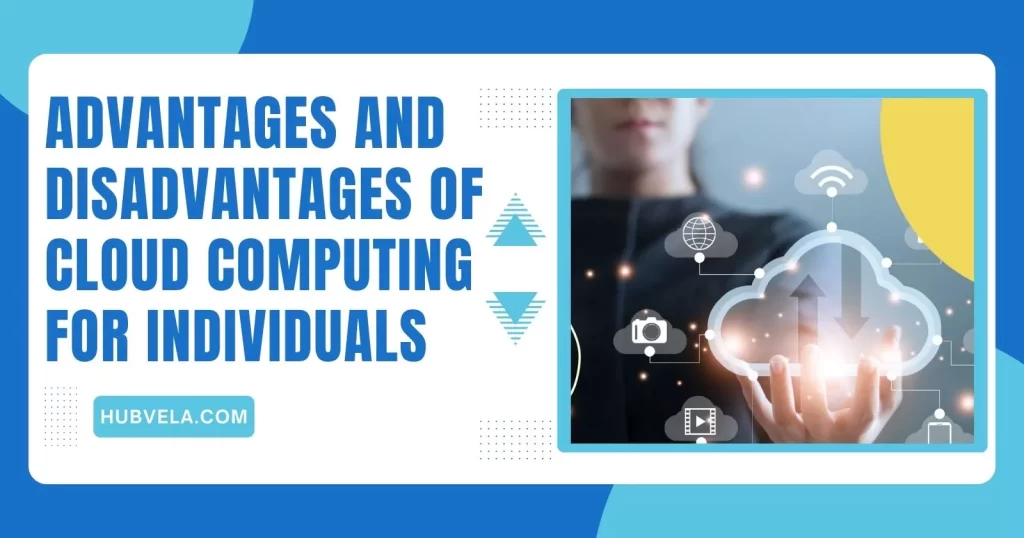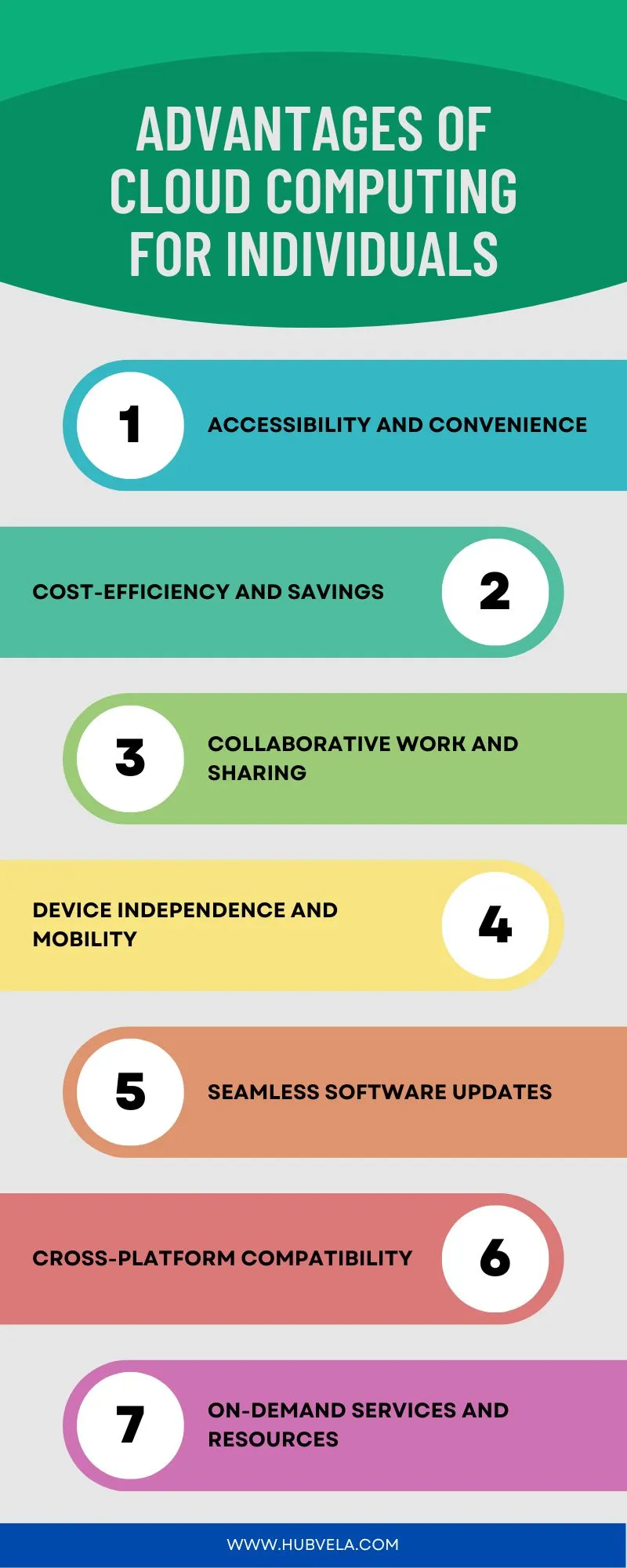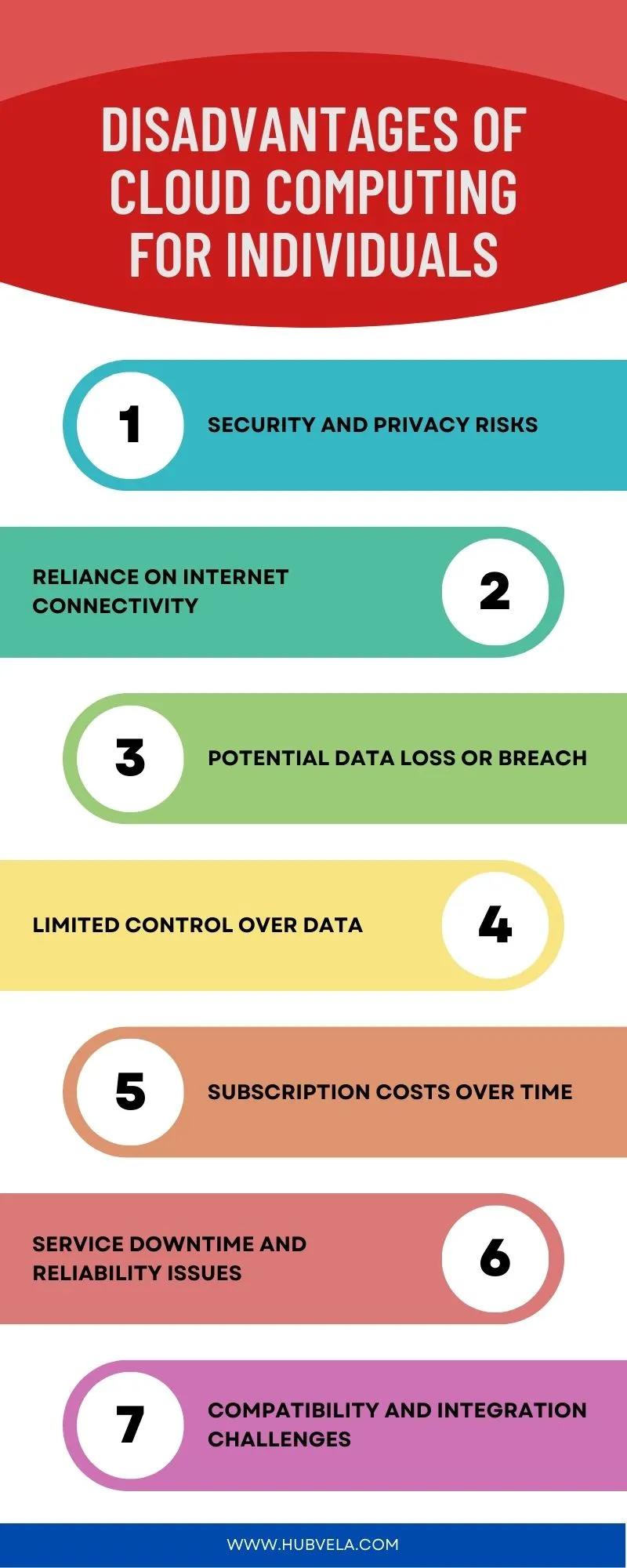Cloud computing has become an integral part of the modern technological landscape, offering a wide array of benefits and drawbacks for individuals.
As the use of cloud computing continues to grow, it is essential to understand the advantages and disadvantages associated with this technology.
From cost savings and scalability to security risks and dependence on internet connectivity, cloud computing presents a complex set of considerations for individuals looking to leverage its capabilities.
In this article, we will delve into the key advantages and disadvantages of cloud computing for individuals, providing valuable insights to help navigate the decision-making process effectively.

--Advertisement--
Advantages of Cloud Computing for Individuals
Cloud computing has become increasingly popular in recent years, and for good reason. It offers many advantages over traditional computing methods, particularly for individuals.
Cloud computing allows users to access data and applications from anywhere with an internet connection, making it highly accessible.
It also reduces hardware and software maintenance costs, making it a cost-effective solution. Additionally, cloud computing offers scalability and flexibility, allowing users to quickly scale resources and storage up or down to meet their needs.
We will explore the advantages of cloud computing for individuals in more detail.

1. Accessibility and Convenience
One of the advantages of cloud computing is its accessibility and convenience. Cloud computing allows users to access data and applications from anywhere with an internet connection, making it easier to work remotely and collaborate with others.
This accessibility and convenience can lead to increased productivity and efficiency, as users no longer have to spend time downloading files or gathering in a conference room to review documents.
Additionally, cloud computing can save costs by eliminating the need for businesses to purchase and maintain server infrastructure and personnel to run it.
However, one of the disadvantages of cloud computing is that it relies on an internet connection, which can be a problem if the connection is slow or unavailable.
2. Cost-Efficiency and Savings
Cost-efficiency and savings are significant advantages of cloud computing for individuals and businesses. Cloud computing allows for substantial cost savings by eliminating the need for physical hardware investments and the requirement for trained personnel to maintain the hardware.
The buying and managing of equipment is handled by the cloud service provider, reducing capital costs and ongoing maintenance expenses.
Additionally, cloud computing offers a pay-per-use model for services, allowing users to pay charges based on their actual usage of the services, which can result in significant cost savings.
Furthermore, cloud computing reduces both hardware and software maintenance costs for organizations, contributing to overall cost-efficiency.
The cost reduction and savings associated with cloud computing make it an attractive option for individuals and businesses looking to optimize their financial resources while benefiting from advanced technological capabilities.
3. Collaborative Work and Sharing
Collaborative work and sharing are key aspects of cloud computing that offer several advantages and disadvantages for individuals.
One of the primary advantages is improved collaboration, as cloud applications enable groups to easily share information and work together on projects through shared storage, regardless of their physical location.
This fosters seamless teamwork and enhances productivity by allowing individuals to access and collaborate on documents and data from anywhere with an internet connection.
Additionally, cloud computing provides excellent accessibility, enabling individuals to quickly and easily access stored information from any location, at any time, using an internet connection.
This flexibility and mobility empower individuals to work efficiently and stay connected with their data and colleagues, promoting a more dynamic and responsive work environment.
However, a potential disadvantage of cloud computing in this context is the security risk associated with sharing sensitive information over the cloud.
Individuals must be mindful of the potential security vulnerabilities and ensure that appropriate measures are in place to protect their data when collaborating and sharing through cloud services.
4. Device Independence and Mobility
Device independence and mobility are two advantages of cloud computing for individuals. With cloud computing, users can access cloud services from anywhere and at any time, regardless of their location.
This means that users are no longer tethered to a single computer or network, and they can change computers without losing access to their applications and documents.
Most web-based software and cloud services are not designed specifically for any one browser or operating system, and many can be accessed via PC, Mac, tablets, and mobile phones.
Cloud computing also allows mobile access to corporate data via smartphones and devices, which is a great way to ensure that no one is ever left out of the loop.
However, one disadvantage of cloud computing is the security risk associated with it.
5. Seamless Software Updates
Seamless software updates are one of the advantages of cloud computing for individuals. With cloud computing, software updates are managed by the cloud service provider, which means that users do not have to worry about manually updating their software.
This can save time and effort, as well as ensure that users are always using the latest version of the software.
Additionally, cloud computing allows for automatic software integration, which means that different software applications can work together seamlessly without the need for manual integration.
However, it is important to note that one of the disadvantages of cloud computing is the security risk associated with sharing sensitive information with a third-party provider.
6. Cross-Platform Compatibility
Cross-platform compatibility is an important consideration when it comes to cloud computing for individuals.
Cloud-based services are a popular way to achieve cross-platform integration because they allow data to be stored in the cloud and accessed from any device with an internet connection.
Cross-platform integration and coordination can save money by eliminating the need to develop separate applications for different platforms, which saves time and resources while also ensuring that applications and systems are compatible with multiple platforms, lowering maintenance and support costs.
However, one of the most difficult challenges of cross-platform integration is ensuring a consistent user experience across all platforms, as different operating systems and device types have their own set of characteristics.
7. On-Demand Services and Resources
On-demand services and resources are a key advantage of cloud computing for individuals. On-demand computing allows cloud hosting companies to provide their clients with access to computing resources as they become necessary.
This means that individuals can quickly increase or decrease their computing resources as needed, either short-term or long-term.
On-demand computing also removes the need to purchase, maintain, and upgrade hardware, as the cloud service organization managing the on-demand services handles resources such as servers and hardware, system updates, and maintenance.
Additionally, many on-demand computing services in the cloud are user-friendly, enabling most users to easily acquire additional computing resources without any help from their IT department, which can help to improve business agility.
However, one disadvantage of cloud computing is that it relies on an internet connection, so a bad connection could keep you from accessing the information or applications you need.
Disadvantages of Cloud Computing for Individuals
Cloud computing has become increasingly popular in recent years, offering businesses and individuals the ability to store and access data and applications remotely.
While cloud computing has many advantages, such as reducing costs and enabling a focus on core business competencies, there are also several disadvantages to consider, especially for individuals and smaller operations.

1. Security and Privacy Risks
One of the major concerns with cloud computing is security and privacy risks. Cloud-based infrastructure is very different from an on-premises data center, and traditional security tools and processes may not be effective in the cloud.
The most cited barrier to cloud adoption is security, with concerns over the security of the cloud service providers themselves, isolation of tenants, patching and cybersecurity practices of the service provider, and the security and reliability of the connection to the cloud service.
Inadequate cloud security measures can lead to data leakage over cloud networks, resulting in intellectual property theft, contract breaches, and malware attacks.
Additionally, placing sensitive data on the cloud has created major security concerns for many organizations, with 66% of organizations expressing concern about this.
Organizations that adopt cloud computing may lack the knowledge to ensure that they and their employees are using it securely, putting sensitive data at risk of exposure.
2. Reliance on Internet Connectivity
One of the primary drawbacks is the potential for downtime, as cloud computing systems are internet-based, making service outages a possibility.
This reliance on internet connectivity can lead to interruptions in accessing services and data, impacting productivity and business operations.
Additionally, the vulnerability to attacks and data breaches due to inadequate cloud security measures poses a significant risk, emphasizing the importance of a stable and secure internet connection.
Furthermore, the reliance on internet connectivity can also result in increased expenses for individuals, as data transfer, cloud utilization, and migration costs may emerge at a later stage.
Therefore, individuals considering cloud computing must carefully evaluate their internet connectivity reliability and security measures to mitigate these disadvantages effectively.
3. Potential Data Loss or Breach
Potential Data Loss or Breach is a significant concern when considering the disadvantages of cloud computing for individuals. One of the primary disadvantages is the issue of security and privacy.
Cloud computing systems are internet-based, making them vulnerable to potential security breaches and data loss. The online nature of cloud computing exposes it to various vulnerabilities, and even the best teams can suffer severe attacks and security breaches from time to time.
Inadequate security measures can lead to data leakage over cloud networks, resulting in intellectual property theft, contract breaches, and malware attacks.
A survey revealed that nearly 98% of companies using cloud computing services experienced at least one data breach from 2020 to 2022, highlighting the real risk of data loss or breach in cloud computing.
Therefore, individuals should carefully consider the potential for data loss or breach when evaluating the use of cloud computing services.
4. Limited Control Over Data
Limited control over data is a significant disadvantage of cloud computing for individuals. Since the cloud infrastructure is owned, managed, and monitored by the cloud service provider, users have minimal control and flexibility over their data and applications within the cloud-hosted environment.
This lack of control can lead to concerns about data security, privacy, and the ability to customize or manage the execution of services within the cloud.
Additionally, cloud providers’ end-user license agreements and management policies may impose restrictions on what customers can do with their deployments, further limiting their control over data and applications.
5. Subscription Costs Over Time
Cloud computing offers advantages such as unlimited storage and computing power, allowing businesses to compete on the same level as larger firms.
However, one of the disadvantages of cloud computing for individuals is the potential for increased costs over time. While cloud computing comes with low initial capital expenditure (CAPEX) costs, individuals may end up spending more on the cloud’s lifecycle subscription, including data recovery costs.
Additionally, adopting cloud solutions on a small scale and for short-term projects can be perceived as expensive, and there may be hidden costs such as data transfer, cloud utilization, and data migration costs.
It’s important for individuals to carefully consider their budget and the long-term cost implications when comparing cloud vs. on-premises costs.
When choosing a cloud hosting provider, it’s crucial to research the potential costs to avoid any potential problems down the road and be aware of the cons of free cloud computing, such as hidden add-ons, downtime, and a history of data breaches.
6. Service Downtime and Reliability Issues
One of the significant disadvantages of cloud computing for individuals is the potential for service downtime and reliability issues.
Cloud computing systems are internet-based, making service outages a possibility for various reasons, such as server downtime or network issues.
This can lead to disruptions in accessing data and applications, impacting productivity and business operations. Additionally, the nature of cloud computing makes it vulnerable to server downtime, which can cause critical damage to businesses depending on the duration of the downtime.
While cloud computing offers flexibility and scalability, individuals should be aware of the downtime risks and consider them when evaluating the suitability of cloud services for their needs.
7. Compatibility and Integration Challenges
One of the challenges of cloud computing is compatibility and integration. Cloud computing requires a reliable and fast internet connection, which can be a challenge for individuals who live in areas with poor connectivity.
Additionally, cloud computing may not be compatible with certain software or hardware, which can make it difficult for individuals to use their preferred tools and devices.
Integration with existing systems can also be a challenge, as it may require significant changes to the way data is stored and accessed.
These compatibility and integration challenges can make it difficult for individuals to fully take advantage of the benefits of cloud computing.
Conclusion on Advantages and Disadvantages of Cloud Computing for Individuals
In conclusion, cloud computing offers several advantages and disadvantages for individuals. The advantages include cost reduction, improved collaboration, excellent accessibility, low maintenance cost, mobility, and unlimited storage capacity.
Cloud computing also provides benefits such as strategic edge, high speed, quick deployment, on-demand self-service, multi-tenancy, resilient computing, fast and effective virtualization, low-cost software, advanced online security, location and device independence, and pay-per-use model.
On the other hand, the disadvantages of cloud computing for individuals involve security risks, downtime, and the possibility of a cloud service provider closing down.
It is important for individuals to carefully weigh these advantages and disadvantages to make informed decisions about utilizing cloud computing services.


